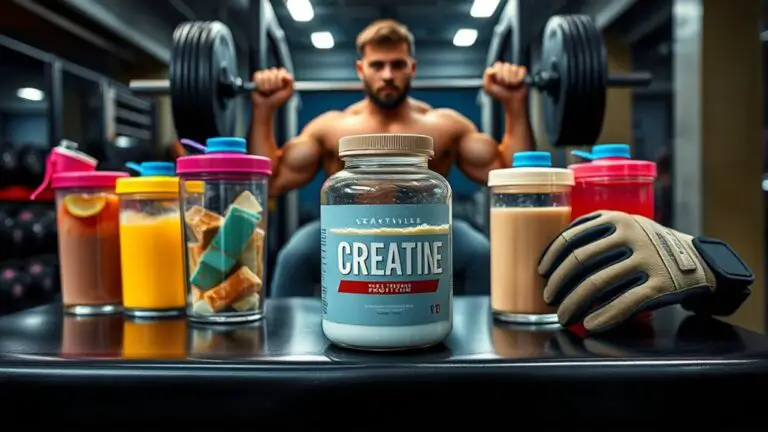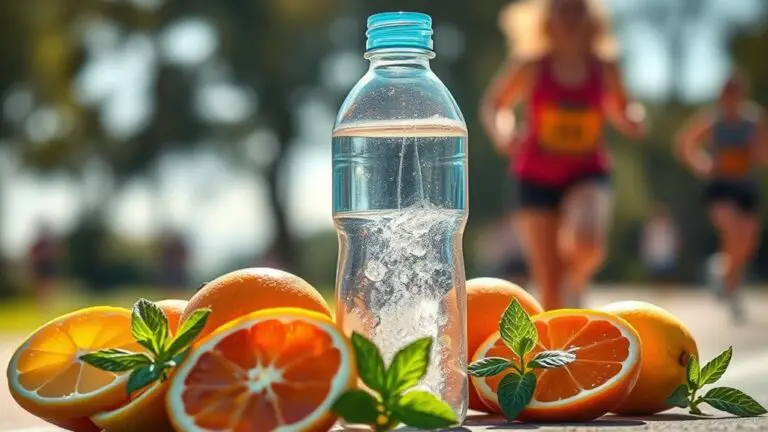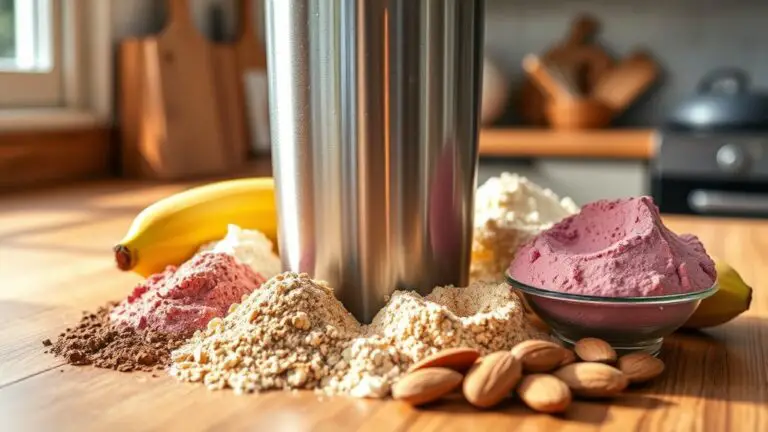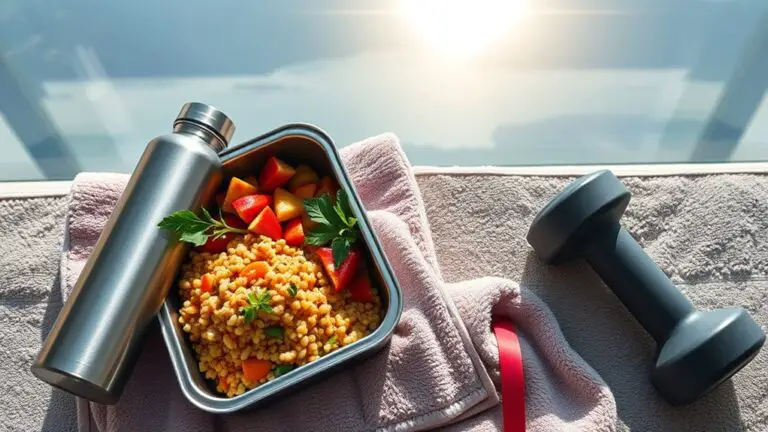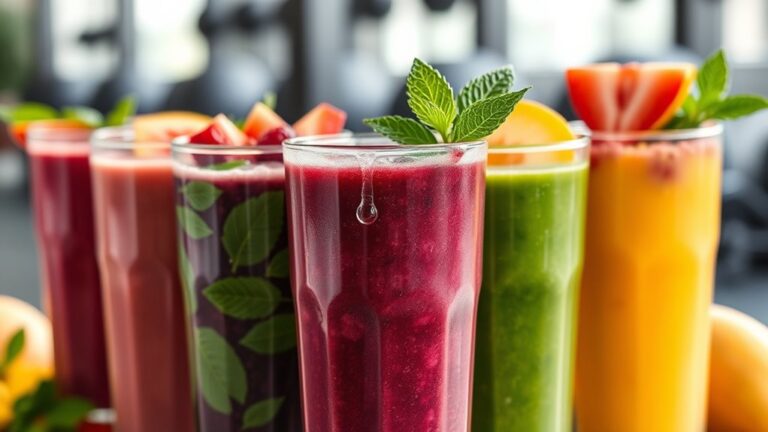The Best Vegan Meal Plans for Strength Athletes
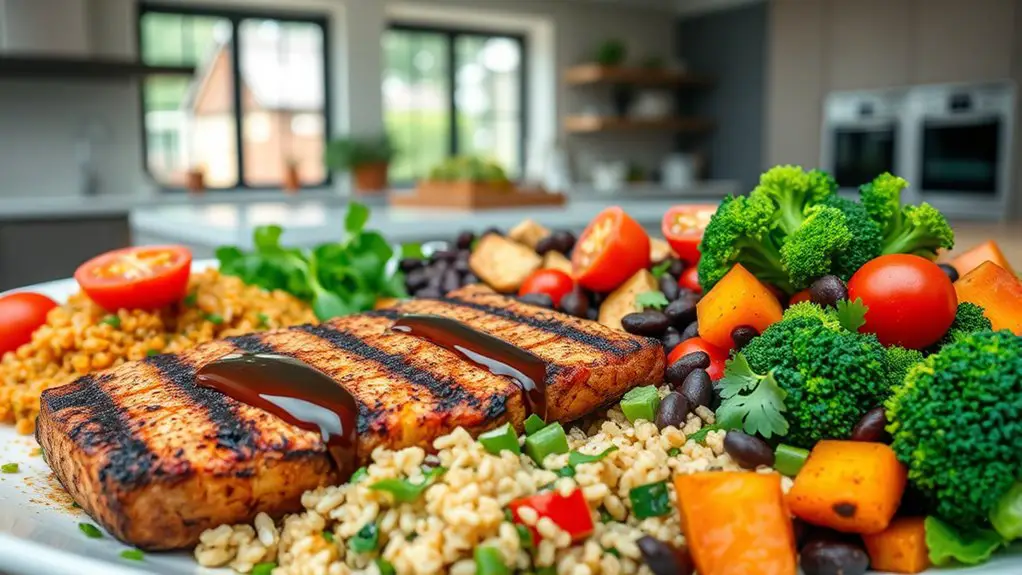
To find the best vegan meal plans for strength athletes, focus on nutrient-dense foods like lentils, quinoa, and tempeh for muscle-building protein. Incorporate a variety of fruits, vegetables, and healthy fats to balance macronutrients and support recovery. Timing your meals around workouts, especially with protein and carbs post-exercise, can enhance performance. Don’t forget to prep meals in advance to stay organized and fueled. Keep exploring to discover meal ideas and tips tailored for your strength training journey.
Essential Nutrients for Strength Athletes on a Vegan Diet
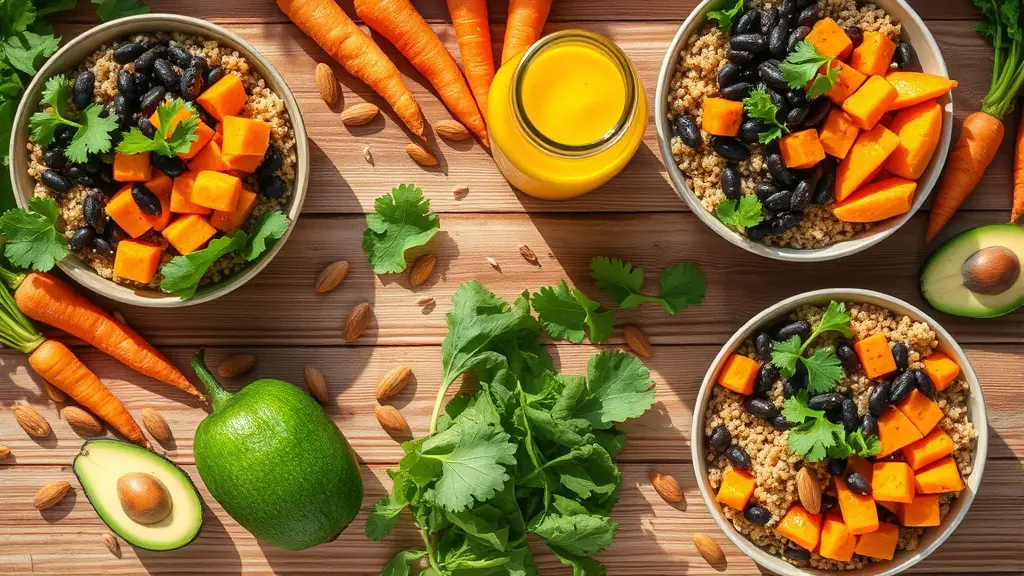
When it comes to fueling your body as a strength athlete on a vegan diet, understanding essential nutrients is vital. To effectively build muscle, you need to prioritize quality protein sources. Foods like lentils, chickpeas, quinoa, and tempeh can provide the amino acids necessary for recovery and growth. Aim for a variety of these sources to guarantee you’re getting a complete protein profile.
Nutrient timing also plays a significant role in your performance. Consuming protein shortly after workouts can enhance muscle repair and growth. Pairing protein with carbohydrates can help replenish glycogen stores, making it easier for you to recover and prepare for your next session.
Additionally, don’t forget about important vitamins and minerals like B12, iron, and omega-3s, which support overall health and athletic performance. By focusing on these essential nutrients, you’ll set a solid foundation for your strength training goals.
Sample Vegan Meal Plan for Muscle Gain
To effectively gain muscle on a vegan diet, it’s essential to create a well-structured meal plan that prioritizes protein-rich foods while also incorporating a variety of nutrients. Start your day with a protein-packed smoothie made from spinach, bananas, and a scoop of pea protein. For lunch, enjoy a quinoa and black bean bowl topped with avocado and salsa—a great source of high protein and healthy fats. Snack on hummus with carrot sticks or a handful of nuts for added calories and nutrients.
Dinner could feature lentil curry served with brown rice and steamed broccoli, ensuring you get those calorie-dense foods necessary for muscle gain. Finally, consider a nighttime snack of almond butter on whole-grain toast to support recovery. By focusing on these high protein sources, you’ll not only fuel your workouts but also promote muscle growth effectively.
Pre- and Post-Workout Vegan Nutrition
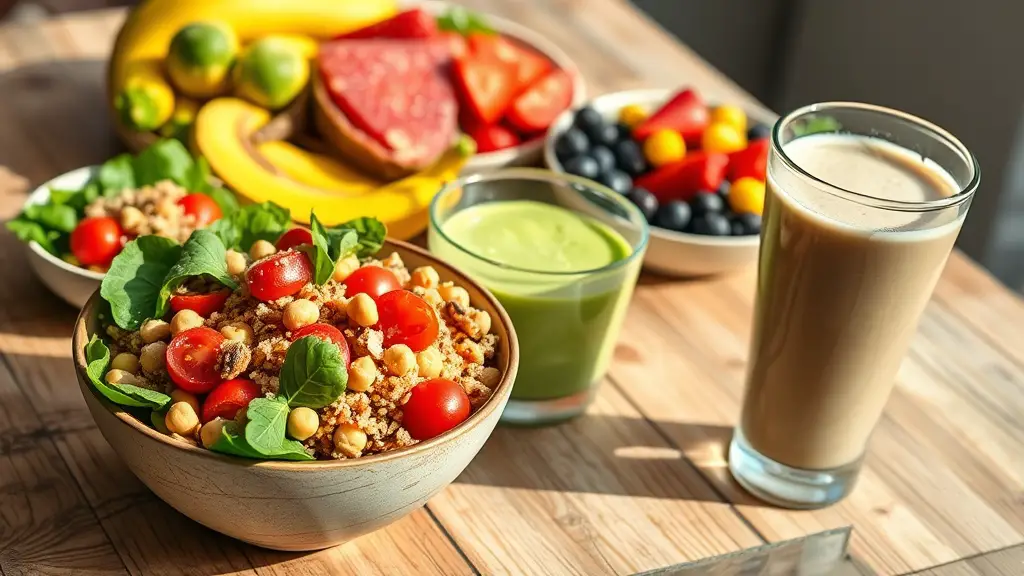
Whether you’re gearing up for a workout or recovering afterward, proper vegan nutrition plays a crucial role in your performance and recovery. For pre-workout snacks, aim for easily digestible carbs combined with a bit of protein. Options like banana with almond butter or a rice cake topped with hummus can provide the energy you need without weighing you down. Consuming these about 30-60 minutes before your workout helps fuel your muscles.
After your workout, focus on post-workout recovery. This is when your body needs protein and carbohydrates to repair and replenish. Smoothies made with plant-based protein powder, spinach, and fruit are a great choice. Additionally, chickpeas or lentils paired with quinoa can offer both protein and carbs. Timing is key; try to eat within 30 minutes post-exercise for ideal recovery. Balancing these elements in your vegan diet will enhance your strength training efforts.
Balancing Macronutrients in a Vegan Diet
Balancing macronutrients in a vegan diet is crucial for strength athletes who want to optimize their performance and recovery. Properly distributing your protein, carbohydrates, and fats helps guarantee you’re fueling your body effectively. Focus on a variety of protein sources like lentils, beans, tofu, and tempeh to meet your needs.
To maintain energy levels and support muscle growth, calorie tracking is essential. Here’s a simple breakdown to guide your macronutrient distribution:
| Macronutrient | Suggested Percentage |
|---|---|
| Protein | 15-25% |
| Carbohydrates | 45-65% |
| Fats | 20-35% |
Adjust these percentages based on your specific training intensity and goals. By finding the right balance, you’ll enhance your strength training and promote recovery, guaranteeing you’re always at your best.
Tips for Meal Prep and Planning for Vegan Strength Athletes
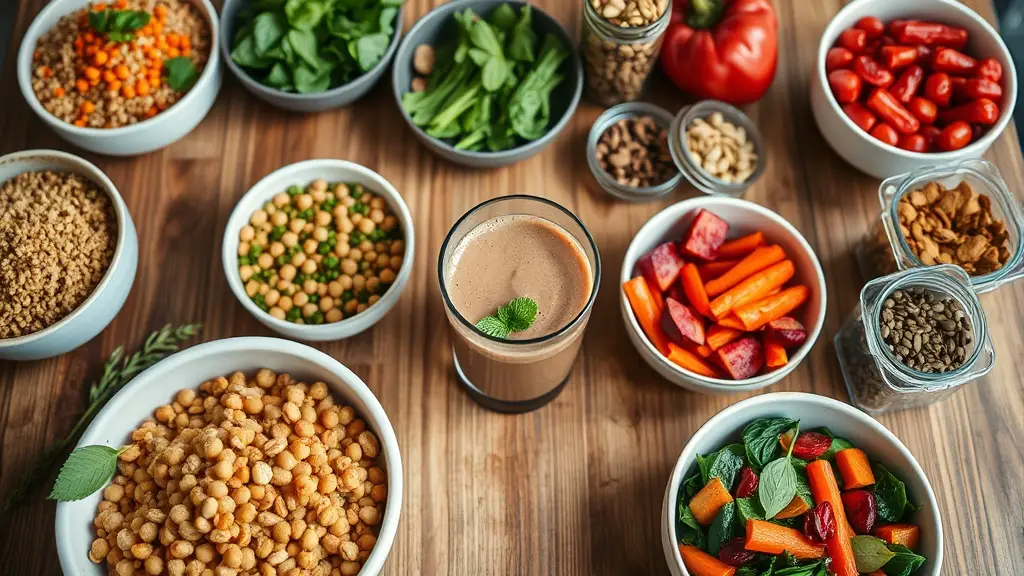
Meal prep and planning can make a significant difference in your performance as a vegan strength athlete. To start, develop a consistent grocery shopping routine. Choose nutrient-dense foods like legumes, whole grains, nuts, and leafy greens. Make a list to guarantee you’re getting all the essential macronutrients.
Batch cooking is another key strategy. Prepare large quantities of meals that can be easily stored and reheated throughout the week. Consider making chili, stews, or grain bowls—these dishes are not only filling but also versatile.
Don’t forget to invest in quality containers to keep your meals fresh. Labeling your meals can help you track their nutritional content and keep them organized. Finally, set aside a specific day each week for prep to streamline the process. By incorporating these strategies, you’ll simplify your meal planning while guaranteeing you stay fueled for your strength training goals.
Frequently Asked Questions
Can Vegan Athletes Build Muscle as Effectively as Omnivores?
You might think building muscle as a vegan is like trying to sail a ship without wind, but that’s far from the truth. With the right approach, vegan muscle building can be just as effective as for omnivores. Focus on high-protein plant foods, ensuring your protein absorption is optimized. Combine legumes, nuts, and whole grains, and you’ll find your gains are just as strong, proving that commitment trumps diet.
What Are the Best Plant-Based Protein Sources for Strength Athletes?
When considering the best plant-based protein sources, legumes stand out for their numerous benefits, including high protein content and essential amino acids. Beans, lentils, and chickpeas can effectively support your muscle-building goals. Don’t overlook quinoa either; it’s a complete protein, offering all nine essential amino acids, which makes it a great addition to your diet. Incorporating a variety of these sources can help you meet your protein needs and enhance your strength training efforts.
How Do I Ensure Adequate Calorie Intake on a Vegan Diet?
You can’t just sprinkle fairy dust on your meals to hit your calorie goals! To guarantee adequate calorie intake on a vegan diet, focus on caloric density by incorporating nuts, seeds, avocados, and whole grains. Don’t forget meal timing; eating more frequent, balanced meals can help you consume enough calories throughout the day. Track your intake occasionally to verify you’re meeting your needs, and adjust portions as necessary to fuel your lifestyle effectively.
Are There Vegan Supplements Recommended for Strength Training?
When considering vegan supplements for strength training, you’ll find several effective options. Vegan protein powders, such as pea, brown rice, or hemp protein, can help you meet your protein needs. Creatine and beta-alanine are also popular supplement types that can enhance performance. Make sure to choose high-quality products and consult with a nutritionist if you’re unsure which supplements are right for your specific goals and dietary needs.
How Can I Overcome Cravings for Non-Vegan Foods?
To overcome cravings for non-vegan foods, identify your craving triggers, like stress or certain environments. When cravings hit, opt for healthy swaps—try a vegan cheese or plant-based chocolate to satisfy your desire without compromising your values. Staying hydrated and maintaining a balanced diet can also help minimize cravings. Remember, it’s okay to indulge occasionally; just find alternatives that align with your lifestyle and keep you feeling good about your choices.

